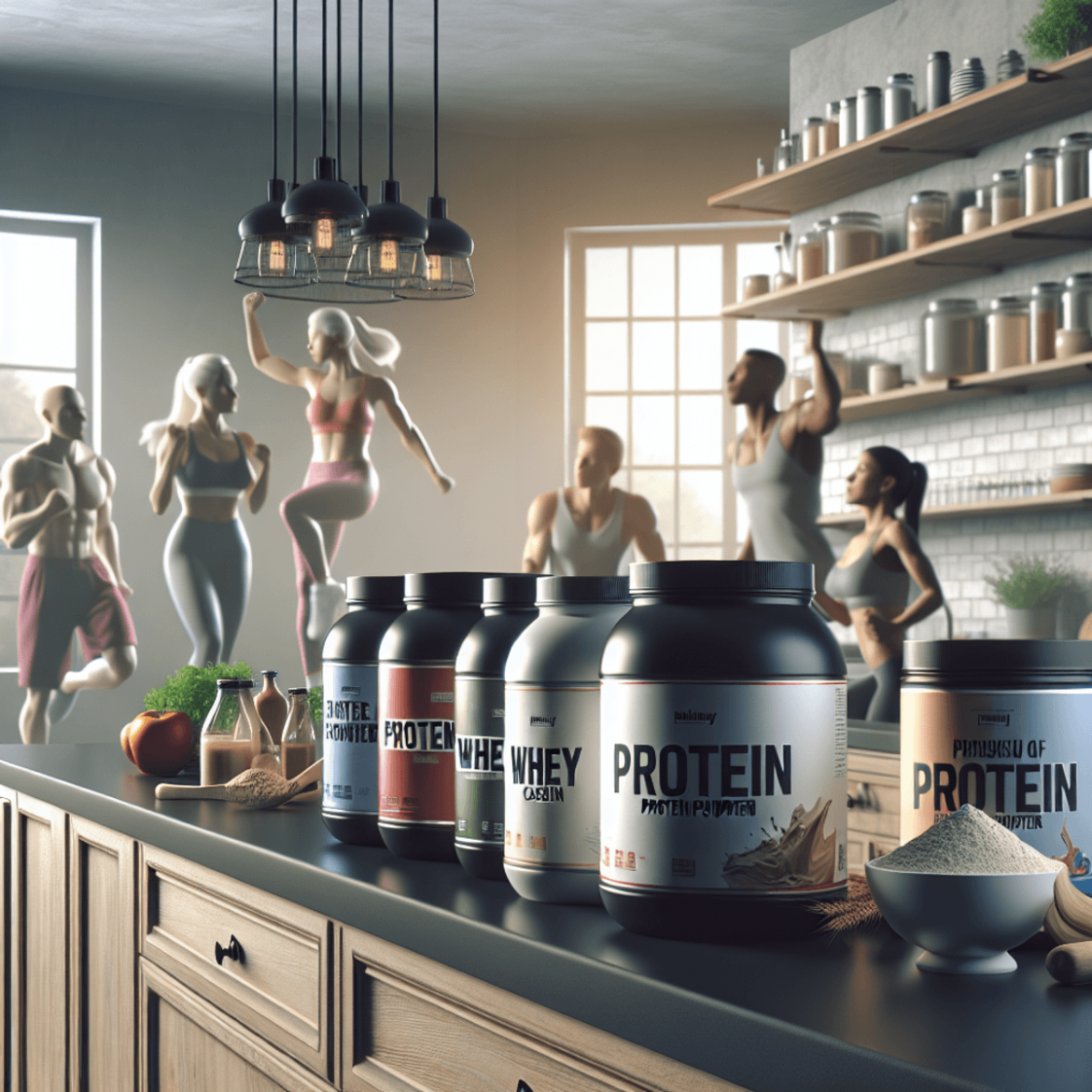Introduction
Protein powders are dietary supplements that provide concentrated sources of protein, essential for fitness and muscle recovery. They come in various forms like whey, casein, soy, pea, rice, and hemp proteins. Each type has unique benefits tailored to different dietary preferences and fitness goals.
Matching the right protein powder to your specific fitness objectives is crucial for optimal results. Whether you’re aiming for muscle gain, recovery, or weight management, the choice of protein can significantly impact your progress.
Key takeaway: Selecting the right protein powder involves considering factors such as your fitness objectives, dietary preferences, and budget.
Understanding Different Types of Protein Powders
Protein powders are dietary supplements that provide a concentrated source of protein, essential for muscle growth, recovery, and overall health. They play a crucial role in fitness regimens by aiding muscle repair post-exercise, boosting recovery times, and enhancing overall performance.
Several types of protein powders are available on the market, each with distinct benefits:
- Whey Protein: This fast-digesting protein is derived from milk and is ideal for post-workout recovery. It’s highly favored for its high biological value and rapid absorption rate, which helps in quick muscle repair.
- Casein Protein: Another milk-derived protein, casein is slow-digesting, making it suitable for overnight muscle repair. It sustains amino acid release over several hours, which can be beneficial before periods of fasting like sleep.
- Soy Protein: A plant-based option known for its complete amino acid profile. Soy protein supports muscle building and recovery while catering to those following a vegetarian or vegan diet.
- Pea Protein: This hypoallergenic choice is rich in branched-chain amino acids (BCAAs), making it effective for muscle growth and repair. It’s an excellent alternative for individuals with allergies or dietary restrictions.
- Rice Protein: Easily digestible and typically low in allergens, rice protein has fewer essential amino acids compared to other options but still serves as a good plant-based supplement for those with specific dietary needs.
- Hemp Protein: Packed with omega-3 fatty acids and other nutrients, hemp protein offers additional health benefits beyond muscle repair. It’s a nutrient-dense option that supports overall wellness along with fitness goals.
Choosing the right type of protein powder involves considering your fitness goals and dietary preferences to ensure optimal results.
Factors to Consider When Choosing a Protein Powder
1. Fitness Goals
Selecting the right protein powder starts with understanding your fitness goals. Different protein powders cater to different objectives such as muscle growth, recovery, or weight management. Here’s how they align:
-
Muscle Growth: For building muscle, whey protein is highly recommended due to its high biological value and rapid absorption rate. Whey contains all essential amino acids and is rich in branched-chain amino acids (BCAAs) which are crucial for muscle synthesis.
Example: Many bodybuilders and athletes opt for whey protein isolate because it delivers a high dose of protein with minimal fats and carbohydrates.
-
Recovery: Post-workout recovery requires a protein that aids in repairing muscle tissues quickly. Casein protein, known for its slow digestion rate, provides a steady release of amino acids over time, making it beneficial for overnight recovery.
Tip: Consuming casein before bedtime can help reduce muscle breakdown during sleep.
-
Weight Management: If weight loss or maintenance is your goal, pea protein could be an ideal choice. It is low in calories yet rich in BCAAs which help preserve muscle mass during calorie restriction. Additionally, plant-based proteins like soy and hemp offer a balanced nutrient profile that supports overall health while aiding in weight management.
Insight: Studies suggest that high-protein diets can increase satiety levels, reducing overall calorie intake.
Understanding your specific fitness goals will guide you towards the most suitable type of protein powder, ensuring you get the best results from your supplementation routine.
2. Dietary Preferences and Restrictions
Choosing the right protein powder involves considering your dietary preferences and restrictions. If you’re vegan or have specific dietary limitations, selecting a suitable protein powder can significantly impact your fitness journey.
Animal-Based Proteins:
- Whey Protein: Derived from milk, whey protein is popular for its rapid absorption and high biological value, making it ideal for muscle growth and recovery.
- Casein Protein: Another milk-based option, casein is slower to digest, providing a sustained release of amino acids that’s beneficial for muscle repair during sleep.
- Egg White Protein: A lactose-free alternative that’s rich in essential amino acids and supports muscle growth effectively.
Plant-Based Proteins:
- Soy Protein: A complete plant-based protein that contains all essential amino acids. It’s a good choice for those seeking to avoid dairy or animal products while still supporting muscle recovery.
- Pea Protein: Hypoallergenic and rich in branched-chain amino acids (BCAAs), pea protein is an excellent option for individuals with allergies or sensitivities.
- Rice Protein: Easily digestible but lower in certain essential amino acids. Often combined with other plant proteins to create a more balanced profile.
- Hemp Protein: Packed with omega-3 fatty acids and fiber, hemp protein offers a nutrient-dense option that supports overall health beyond just muscle gain.
Key Considerations:
- Dietary Restrictions: Identify any food allergies or intolerances that might influence your choice between animal-based and plant-based proteins.
- Vegan Options: Ensure the protein powder is certified vegan to align with ethical or lifestyle choices.
- Nutritional Quality: Check the label for added sugars, fillers, and artificial ingredients that might not fit your dietary needs.
By aligning your selection with personal dietary preferences, you ensure that the protein powder you choose not only supports your fitness goals but also fits seamlessly into your daily routine.
3. Nutritional Quality and Ingredients to Look For
Selecting the right protein powder involves careful examination of its nutritional content and ingredient list. This helps ensure you’re getting a high-quality product that aligns with your fitness goals, whether it’s muscle growth, recovery, or weight management.
Key Factors to Consider:
- Protein Content: Aim for a protein powder that provides at least 20-30 grams of protein per serving. This amount supports muscle repair and growth efficiently.
- Amino Acids: Look for a complete amino acid profile, especially essential amino acids like leucine, isoleucine, and valine. These are crucial for muscle synthesis and recovery.
- Added Sugars and Fillers: High-quality protein powders should be low in added sugars and free from unnecessary fillers. Excessive sugars can hinder your fitness goals by adding unwanted calories.
Ingredients to Watch Out For:
- Artificial Sweeteners: While they lower calorie content, some artificial sweeteners can cause digestive issues or other side effects in sensitive individuals.
- Fillers: Ingredients like maltodextrin or gums may be added to improve texture but offer no nutritional benefits.
- Quality Protein Sources: Opt for protein powders derived from reputable sources. For instance, whey protein isolates tend to be purer than concentrates.
Label Examination Tips:
- Transparency: Brands that provide clear information about their ingredient sources and processing methods often offer higher quality products.
- Third-party Testing: Certifications from organizations like NSF or Informed-Sport can assure you of the product’s safety and label accuracy.
Ensuring the nutritional quality of your protein powder supports not only your specific fitness objectives but also contributes to your overall health by providing necessary nutrients without harmful additives.
4. Taste, Mixability, and Brand Reputation
Factors to consider when choosing a protein powder include not only nutritional content and alignment with fitness goals like muscle growth, recovery, and weight management but also taste and mixability. These aspects can significantly impact your consistency in using the product.
Taste Options:
- The flavor of a protein powder often dictates whether you’ll stick with it long-term. It’s wise to sample small packets or trial sizes before committing to a larger purchase.
- Popular flavors include chocolate, vanilla, and strawberry. Some brands offer unique options like cookies and cream or mocha.
Blendability Issues:
- Mixability refers to how well the powder blends with liquids. Poorly mixed powders can lead to clumping, which can be off-putting.
- To test blendability, try mixing the powder in different liquids such as water, milk, or plant-based milk alternatives. Shaker bottles or blenders can help achieve a smoother consistency.
Trusted Brands:
- Opting for well-known brands can often ensure a higher level of quality and safety.
- Some reputable brands in the market include Optimum Nutrition, Garden of Life, and Vega. These brands are often favored for their consistent quality and positive customer reviews.
Third-party Certifications:
- It’s beneficial to look for third-party certifications on the packaging. Certifications from organizations like NSF International or Informed-Sport provide assurance regarding product safety standards.
Investing time in finding a protein powder that you enjoy can make a significant difference in your fitness journey.
The Role of Protein in Overall Health Beyond Fitness Goals
Adequate protein intake plays a crucial role not just in achieving specific fitness outcomes but also in supporting various overall health functions. Here are some key areas where protein is indispensable:
1. Immune Function
Proteins are vital for the production of antibodies and immune system cells. Consuming enough protein helps maintain a robust immune response, protecting the body against infections and illnesses.
2. Bone Health
Protein is essential for maintaining bone strength and density. It works alongside calcium and vitamin D to support bone tissue, reducing the risk of osteoporosis and fractures as you age.
3. Muscle Repair
After physical activity or injury, your muscles require adequate protein to repair and rebuild. This process is crucial for muscle recovery, growth, and overall maintenance, ensuring that your body remains strong and functional.
A well-balanced diet with sufficient protein supports these essential bodily functions, contributing to long-term health and wellbeing.
Incorporating Whole Food Sources Alongside Supplementation
Combining whole food proteins with supplementation offers several advantages for a balanced diet. Whole foods like lean meats, dairy products, nuts, and legumes provide not only protein but also essential vitamins, minerals, and other nutrients that protein powders alone may lack.
Benefits of Whole Food Proteins:
- Nutrient Density: Whole foods deliver a range of nutrients beyond just protein. For example, lean meats are rich in iron and B vitamins while dairy products offer calcium and vitamin D.
- Satiety Levels: Consuming whole foods can promote feelings of fullness, helping to manage hunger throughout the day. This can be particularly beneficial if your fitness goals include weight management.
- Digestive Health: Many whole food sources of protein also contain dietary fiber, which supports digestive health. Beans and legumes are excellent examples.
Supplementation:
While whole foods should form the foundation of your diet, supplementing with protein powders can help you meet your daily protein requirements more conveniently. Protein powders are especially useful:
- Post-Workout Recovery: They provide a quick source of amino acids that aid muscle repair and growth after intense exercise.
- Busy Lifestyles: For those on the go, protein shakes offer a portable and easy way to boost protein intake without the need for meal preparation.
By integrating both whole food proteins and supplementation, you achieve a well-rounded approach to meeting your nutrient needs while supporting your fitness goals effectively.
Making an Informed Choice Based on Your Unique Needs
Personalizing your approach to choosing the right protein powder can significantly impact your fitness journey. By considering your unique needs, you ensure that the selected product aligns perfectly with your goals and lifestyle.
1. Fitness Goals
Clearly define whether you aim for muscle gain, recovery, or weight management. For muscle building, whey protein might be ideal due to its rapid absorption. For recovery, casein’s slow-digesting properties could be beneficial.
2. Dietary Preferences
Evaluate whether you prefer animal-based proteins like whey or casein or plant-based options such as soy or pea protein. This choice is crucial for dietary adherence and overall satisfaction.
3. Nutritional Quality
Scrutinize the ingredient list for added sugars and fillers. High-quality powders should provide substantial protein per serving along with essential amino acids.
4. Taste and Mixability
Finding a flavor and texture you enjoy can encourage consistent use. Sampling different brands can help identify the best fit for your palate.
5. Budget
Balance between quality and cost to find a product that meets your needs without breaking the bank.
Each person’s nutritional requirements vary, making personalized nutrition a key factor in achieving optimal results. Through careful consideration of these factors, you can select the most suitable protein powder to complement regular exercise routines and dietary practices.



